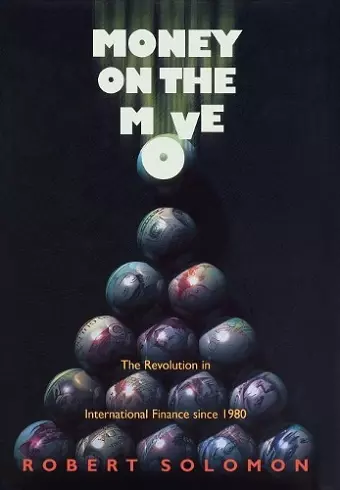Money on the Move
The Revolution in International Finance since 1980
Format:Hardback
Publisher:Princeton University Press
Published:9th Mar '99
Should be back in stock very soon

Solomon is a very knowledgeable and well-connected observer of the international monetary scene, and he is a clear expositor. Both of these characteristics shine through in this book. The material is well organized, and the writing is crisp and lucid. -- Peter Montiel, Williams College
Beginning with the spectacular rise and subsequent decline of the foreign exchange value of the US dollar in the 1980s, this book covers the debt crisis of developing countries in the 1980s. It also explores the shift from central planning to market economies in many countries in the 1990s.The international monetary system has changed radically in the last twenty years. Capital, information, goods, and services move around the globe with unprecedented ease. Countries from the former communist bloc have joined the system. Europe is on the verge of monetary union. Financial crises in East Asia and Mexico have rocked the world economy. In this book, Robert Solomon--author of the definitive history of the monetary order between 1945 and 1981--presents the first comprehensive history of these and other aspects of this revolution in international finance. Authoritative, accessible, and elegantly written, the book will be indispensable for anyone who wishes to understand how today's international monetary system works. Solomon begins with the spectacular rise and subsequent decline of the foreign exchange value of the U.S. dollar in the 1980s. He covers the debt crisis of developing countries in the 1980s. He explores the shift from central planning to market economies in many countries in the 1990s and explains the origins, implications, and problems of the move to a single European currency. Solomon examines in detail the striking increase in the mobility of capital--paying particular attention to the costs and benefits for developing countries, and to the role of capital mobility in the Mexican crisis of 1994 and the Asian crisis that began in 1997. In the book's final chapter, Solomon provides an overview of the international monetary system and considers how it might evolve in the future. In this section, he focuses on the key subjects of balance-of-payments adjustments, supply of reserves, and stability. He also evaluates a variety of much-debated policy instruments, including inflation targeting, currency boards, target zones for exchange rates, free-floating exchange rates, the Tobin tax, macroeconomic policy coordination, and special drawings rights. Throughout, Solomon relates developments in the international monetary system to macroeconomic conditions in the countries involved--arguing that it is impossible to understand one without understanding the other. As a clear, thorough, and unusually perceptive account of global finance and monetary economics in the late twentieth century, Money on the Move will be vital reading for economists, policymakers, and general readers.
"Solomon ... does a credible job of explaining the rise of the U.S. dollar and its fall by the mid-1980's... Of particular note is the chronology of economic events since 1980."--Library Journal "Money on the Move is an excellent, erudite addition to the literature on modern financial history."--Bimal Prodhan, The Times Higher Education Supplement "Solomon's writing is both eminently accessible to the nontechnical reader and intellectually rigorous, making it fascinating reading for policymakers and economists as well. This volume ... offers perhaps the most readable overview of the international monetary system over the past two decades... Solomon brings international policy issues vividly to life without displaying any personal biases or sacrificing insights from economic theory."--Subir Lall, Finance and Development
ISBN: 9780691004440
Dimensions: unknown
Weight: 510g
224 pages